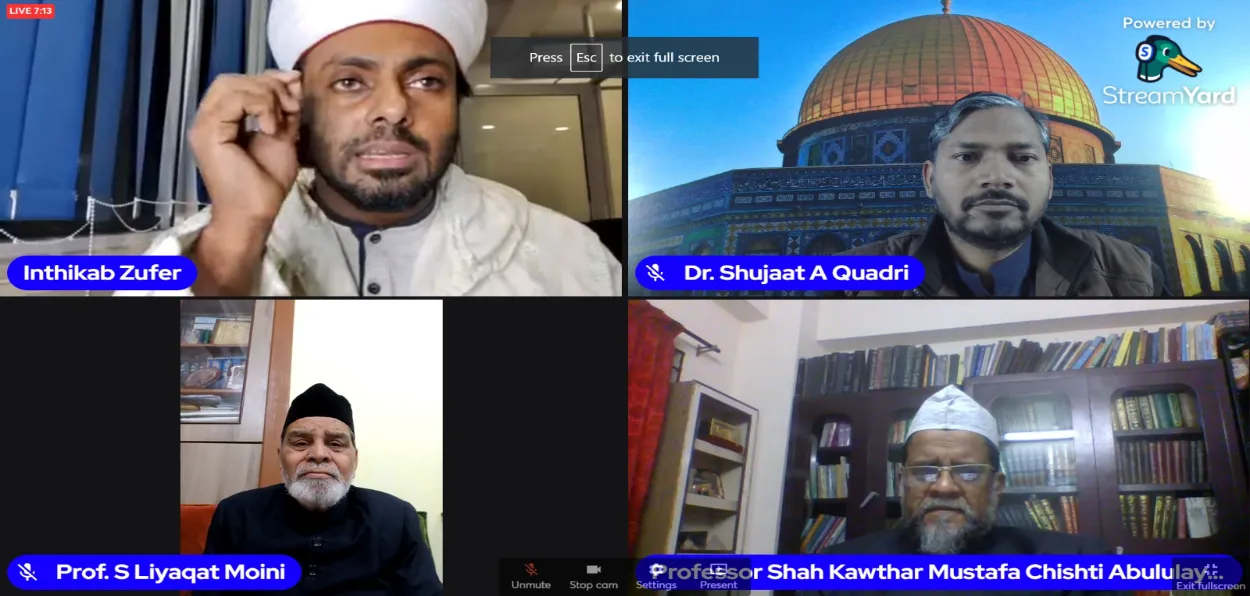
New Delhi
The Indian Chishty Order had a significant impact on the Indian subcontinent, particularly in the realm of spirituality and religion. The order was founded in the 11th century by the Sufi saint Khwaja Moinuddin Chishty, who is known for his emphasis on devotion, love, and the personal experience of union with God. This is what Prof Syed Liaqat Husain Moini Chishty, Director of Indo Islamic Heritage Center, and Gaddinasheen of Ajmer Dargah said in a webinar on “Impact and Reflection of Chishty order in Indian Sub-continent" organised by the Muslim Students organisation of India.
Speaking at the webinar Prof Shah Kausar Chishti Abululayi Chairman, Department of Philosophy, and Director of the Development Centre for Philosophical Studies at the University of Dhaka said that the impact of Indian Islam in Bangladesh has been significant, shaping the country's religious, cultural, and social landscape.
Bangladesh was part of the Indian subcontinent for much of its history, and its cultural and religious traditions were heavily influenced by the Indian traditions of Hinduism, Buddhism, and Islam. One of the most notable impacts of Indian Islam in Bangladesh is the spread of Sufism, a mystical form of Islam that emphasizes personal devotion and the experience of union with God.
Sufism was introduced to Bangladesh by Indian Sufi saints and mystics, and it became popular among the masses due to its emphasis on spiritual fulfillment and its rejection of religious formalism. Sufi shrines and tombs continue to be an important part of the religious and cultural landscape of Bangladesh.
He further explained that Indian Islam also had an impact on the development of the Bengali language and literature. Many Bengali Muslim scholars and poets were influenced by Indian Sufi traditions and their works reflect this influence. The Sufi emphasis on devotion and love is a recurring theme in Bengali literature, and Sufi saints are celebrated in poems and songs. Indian Islam also played a role in shaping the political landscape of Bangladesh. Sufi leaders and scholars often played an important role in mediating conflicts and promoting peace and justice in society. They also helped to foster a sense of unity and solidarity among the diverse religious and ethnic communities in Bangladesh.
Speaker from Sri Lanka, Inthikab Zufer, Associate Professor and chief operating officer for International Medical Campus said that Chishty order and teaching of Khwaja Moin ud Din has had a profound impact on Sri Lanka, shaping its religious, cultural, and political landscape.
Its legacy continues to be felt in the country, and Sufi traditions and practices remain an important part of its cultural heritage.
He said that the ideals of Sufism, as taught by the Chishtys, helped to create a more tolerant and pluralistic society in Sri Lanka, where people of different religions and backgrounds could coexist peacefully. Additionally, the Chishty Order's emphasis on generosity and hospitality inspired some Sri Lankan Sufi communities to establish communal kitchens and hospices, which served as centers of social and spiritual life for local communities. This helped to promote a culture of generosity and compassion, and provided support for the poor and needy.
Dr Shujaat Ali Quadri Chairman of MSO who moderated of the webinar said that the Chishty Order also had a profound impact on the cultural and political life of the Indian subcontinent. The order's teachings of love and tolerance influenced the attitudes of the rulers and the ruled, and helped to create an atmosphere of mutual respect and harmony. The Chishtys played a significant role in promoting pluralism and tolerance in a region that was marked by religious and ethnic diversity.
He said the Chishty Order had a far-reaching impact on the Indian subcontinent, shaping its religious, cultural, and political landscape. Its teachings continue to be relevant and inspiring, and its legacy is still felt in the region today.
